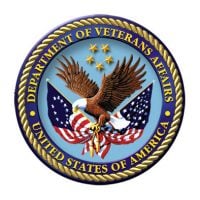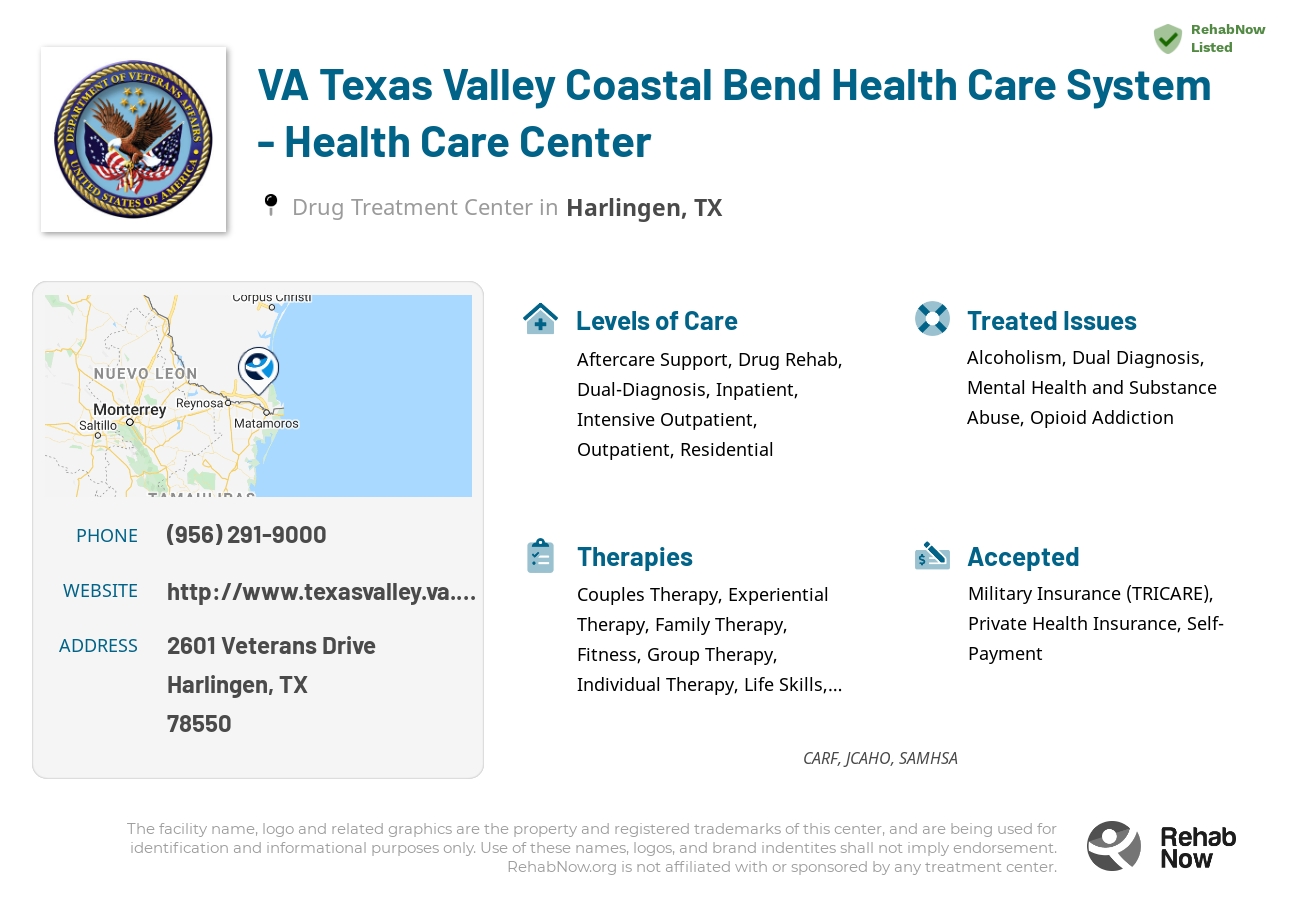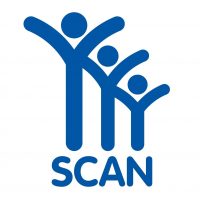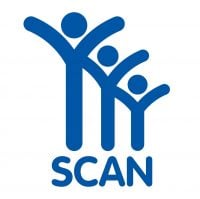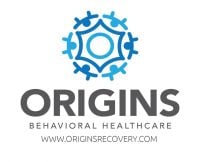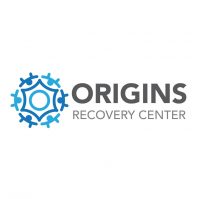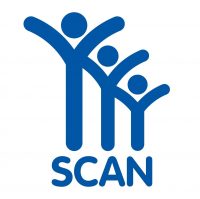About VA Texas Valley Coastal Bend Health Care System - Health Care Center in Texas
VA Texas Valley Coastal Bend Health Care System - Health Care Center is an accredited drug rehab in Harlingen, Texas that offers a variety of methods methods and programs for Alcohol Abuse, Dual Diagnosis (Co-Occuring Disorders), Opioid Addiction, Drug Addiction, and other substance issues. VA Texas Valley Coastal Bend Health Care System - Health Care Center is a place where you can find the help and support that you need to get clean. They offer a variety of levels of care, including detoxification, residential treatment, outpatient services and more. The goal is to provide the best possible care for our patients so they can overcome their addictions once and for all.
VA Texas Valley Coastal Bend Health Care System - Health Care Center offers customized treatment plans that address each person’s unique needs so they can overcome their addictions once and for all. With personalized care from experienced professionals, you have nothing to lose but everything to gain when it comes to living a healthy life without drugs or alcohol. This facility accepts both men and women. Treatment here is offered to all genders, and notably supports LGBTQ+.
Accreditations, licenses, and certifications are all important when selecting a center. VA Texas Valley Coastal Bend Health Care System - Health Care Center maintains a CARF Accreditation. This facility has Joint Commission Accreditation. You can also find VA Texas Valley Coastal Bend Health Care System - Health Care Center listed in the national SAMHSA database. This facility accepts Military Insurance (TRICARE), Private Health Insurance, Self-Payment, Sliding Scale as methods to cover the cost of treatment. Fortunately, private health insurance is accepted here. For additional information regarding paying for treatment, contact our admissions counselors now.
Genders
Ages
Modality
Additional
Accreditations
SAMHSA

JCAHO

CARF
The Commission on Accreditation of Rehabilitation Facilities (CARF) is a non-profit organization that specifically accredits rehab organizations. Founded in 1966, CARF's, mission is to help service providers like rehab facilities maintain high standards of care.
Conditions and Issues Treated
Opioid addiction has become a significant health problem in the United States. When a person’s life becomes unmanageable because of an opioid addiction, treatment can help them get sober. Treatment includes medical care and counseling.
“With so many people struggling with opioid addiction, we need more care and attention for those who want to quit. Opioid addicts often take opioids when they experience a painful injury – that’s how the cycle starts! When someone begins taking their medication differently than prescribed or takes an excessive amount of drugs, it means they’re hooked on drugs and in danger of overdosing.
The most successful way to beat this is through detoxing from these types treatments at VA Texas Valley Coastal Bend Health Care System - Health Care Center in . Most facilities start by using medical support during the process while providing counseling services; rehabilitation comes later on after treatment has been completed successfully.
A “dual diagnosis” is when the individual has two medical issues at the same time. The top co-occurring mental disorders with addiction are depression, anxiety, ADHD, bi-polar disorder. Addiction is also considered a mental illness that is not a choice but rather a medical condition. Addiction can be caused by any number of underlying issues.
Dual diagnosis is provided by VA Texas Valley Coastal Bend Health Care System - Health Care Center to treat addictive tendencies as well as any untreated mental illnesses. This ensures successful long term health and recovery for patients after treatment has been completed.
Dual diagnosis is provided by VA Texas Valley Coastal Bend Health Care System - Health Care Center to treat addictive tendencies as well as any untreated mental illnesses for people in Texas. This ensures successful long term health and recovery for patients after treatment has been completed.Levels of Care Offered
This center offers a variety of custom treatment tailored to individual recovery. Currently available are Aftercare Support, Drug Rehab, Dual-Diagnosis, Inpatient, Intensive Outpatient, Outpatient, Residential, with additional therapies available as listed below.
Going to an inpatient rehab facility means living there while all aspects of addiction or co-occurring disorder get addressed. The treatment involves medical supervision, therapy, and future planning.
This type of rehabilitation provides a drug-free environment for people who struggle with chronic/long-term addiction without having access to drugs outside the center (or their own home). It takes away any distractions because they live there 24 hours per day. If someone is trying to break out old habits, which could lead them back into substance abuse, things like jobs or school can be put on hold until after they complete their stay to focus solely on recovery.
Outpatient addiction treatment is beneficial for people who are able to function well in their day-to-day lives. It is recommended for people who are not yet ready to end their relationships with friends or family members who might be encouraging drug and alcohol use.
Intensive outpatient treatment is beneficial for:
- People who are able to attend treatment more than 3 times per week.
- People who do not meet the criteria for inpatient treatment.
- People who are able to contribute to their own recovery outside of the treatment center.
- People who are motivated towards recovery.
- People who are able to overcome addiction on their own without the need for higher levels of care.
Outpatient programs at VA Texas Valley Coastal Bend Health Care System - Health Care Center, the Harlingen resident can live with their family while continuing with their job or studies. Treatment includes educating the patient on drug abuse, medications, and counseling sessions at the individual or group level. Outpatient treatment plans cover diagnosis, detoxification, management, and counseling. They are a popular option for those who have graduated from inpatient facilities.
Residential treatment programs are those that offer housing and meals in addition to substance abuse treatment. Rehab facilities that offer residential treatment allow patients to focus solely on recovery, in an environment totally separate from their lives. Some rehab centers specialize in short-term residential treatment (a few days to a week or two), while others solely provide treatment on a long-term basis (several weeks to months). Some offer both, and tailor treatment to the patient’s individual requirements.
Without aftercare support, addicts can easily relapse back into addiction. It is crucial to integrate the addict back into society. Aftercare support should take place after outpatient treatment has ended.
There are a few different types of aftercare support that patients can seek after completing an inpatient treatment program:
- 12 Step Self-help groups (AA, NA)
- Therapeutic communities,
- Long-term, structured sober living arrangements
- Halfway houses (residential treatment centers)
Many different support groups exist for addicts to seek help after treatment. Some are more effective than others, depending on the person’s addiction, background, and other factors.
Therapies & Programs
Individual therapy is a form of counseling where you meet with a trained professional one-on-one. Meeting with a therapist in this setting allows for a personal and trusting relationship to be built. This allows the patient to open up about sensitive or private issues they may not feel comfortable discussing in a group. Individual therapy helps identify the root causes of your addiction, which can help prevent relapse.
Couples therapy for drug addiction is a unique form of therapy that allows family members to work through the emotional issues of their loved one’s addiction together. Family members can support each other while learning how to cope with the addiction and encourage healthy changes. The two will work with a therapist to learn how the addiction affects themselves and the relationship.
Family therapy is often done alongside drug treatment to help addicts stay sober. The goal of family therapy for drug addiction is to create an environment where communication can happen without judgment, hostility, or blame. The therapist will sit with the family so they can learn how to communicate differently and provide new tools for dealing with emotions so that people don’t want to drink or do drugs. It’s important for families to focus on relapse prevention plans during treatment so that if the addict feels like they want to use again, they’ll know what steps they need to take together to prevent it from happening again in the future.
Group therapy sessions are another common addiction recovery service. These group sessions typically involve six to 12 addicts who meet regularly with a trained professional for support and guidance.
During these sessions, the group shares their experiences with one another and provides feedback that can help each member avoid relapse or overcome specific obstacles they are facing in their recovery process. With this type of support and guidance, addicts can feel like they are part of a community that understands their struggles and will help them get through the hard times.
Many people struggling with drug addiction have experienced some form of trauma in their lives. It is crucial that these individuals seek out professional help; otherwise, their drug abuse and addiction will likely continue.
Therapists and counselors at drug treatment centers employ several treatment programs to help people struggling with drug addiction, including trauma therapy. Trauma therapy helps people dealing with addiction by allowing them to confront the traumas of their past and move past them.
It is important to note that trauma therapy should not be confused with PTSD (post-traumatic stress disorder). Rather, it is used to treat the effects of trauma, which are often at the root of addiction.
Cognitive Behavioral Therapy at VA Texas Valley Coastal Bend Health Care System - Health Care Center
Cognitive Behavioral Therapy (CBT) focuses on the underlying thoughts and behaviors that caused the problem of addiction in the first place and may cause a relapse. Negative feelings are common in drug abuse disorders, but they can lead to co-occurring disorders if not recognized. CBT involves strategies that help to change the behavior pattern by restructuring negative thoughts into positive ones. It helps to remove these feelings, and it provides long-term benefits. Also, CBT promotes self-awareness and self-control. It can be administered as a monotherapy or as part of combination therapy.
CBT can improve the patient’s mood, reduce drug cravings and boost success rates on treatment plans. Regular practice can help individuals handle negative attitudes, thoughts, and feelings without turning to drugs or alcohol. The core belief of Cognitive Behavioral Therapy (CBT) is that one’s moods, behaviors, and actions are all connected. Individuals can improve their quality of life using CBT. It helps addicts understand the patterns of thought and feelings that cause them to use drugs or alcohol and develop a healthy response.
It’s not as simple as quitting drinking or using drugs and expecting the hard part to be over. Many addicts in recovery have discovered that they need to improve skills such as time management, organization, communication, socialization, and self-esteem. Learning certain life skills can help those who are struggling with addiction.
Medical nutrition therapy for addiction helps patients at VA Texas Valley Coastal Bend Health Care System - Health Care Center avoid “trigger” foods. Someone who craves alcohol may be sugar addicted. Eating a balanced diet with adequate protein, vegetables, and fruit can help reduce drinking urges.
MNT is a type of addiction treatment that teaches patients about healthy eating habits while counseling them. These sessions include meal planning, cooking demonstrations, shopping tips, grocery store tours, and food education.
Nicotine replacement therapy is a drug treatment that allows people to get the effects of nicotine without chewing or smoking. The therapy is often done with a patch, and doses of nicotine are reduced until nicotine is no longer needed. NRT helps smokers get nicotine into their system without resorting to smoking, and it has been shown to be an effective way to help people quit smoking. Coupling NRT with counseling and other means of support gives long-term smokers a better chance of removing their unhealthy habit.
Patient Experience
Experiential Therapy at VA Texas Valley Coastal Bend Health Care System - Health Care Center
Drug addiction causes the formation of abnormal connections between neurons in the brain to form due to repeated exposure to drugs. These connections are responsible for addictive behaviors to drugs. Experiential therapy is done with patients individually and is different from traditional talk therapy. This therapy can help people revisit past traumas, heal, and move on in life in a more authentic way.
Experiential therapy uses activities to recreate experiences that may have caused trauma or negative emotions. These activities include role-playing, arts and crafts, animal care, music, or rock climbing. The individual will gradually experience calmness and love and change their perception positively through this therapy. Other than drug addiction, experiential therapy can be helpful for behavioral or eating disorders.
Fitness Therapy
A fitness therapist may suggest a variety of workouts to help you improve your strength, endurance, speed, and agility. Whether recovering from an injury or illness, getting back into shape after a long layoff, or looking for ways to increase stamina, the plan is often tailored to a specific individual’s needs. Training can take place in a gym or at home.
- Encouraging healthy eating and exercise habits to really get the body back into good working order
- Providing a distraction from cravings and underlying psychological issues that could lead to relapse
- Gaining a sense of accomplishment from completing physical challenges that further personal development
- Improving cardiovascular health and circulatory system functioning and increased energy levels to help the body stay active and enhance mood
Payment Options Accepted
For specific insurance or payment methods please contact us.
Is your insurance accepted?
Ask an expert, call (888) 674-0062
Additional Details
Specifics, location, and helpful extra information.
Harlingen, Texas 78550 Phone Number(956) 291-9000 Meta DetailsUpdated November 25, 2023
Staff Verified
VA Texas Valley Coastal Bend Health Care System - Health Care Center Patient Reviews
There are no reviews yet. Be the first one to write one.
Harlingen, Texas Addiction Information
Texas is one of the primary hubs for drug smuggling into the country. The border between Texas and Mexico is more than 1,000 miles long. More than 10 million residents use alcohol every year and more than 25% of those are minors. Alcohol and drug use has become so common in Texas that almost 15% of all deaths can be attributed to these substances.
Almost 50% of the prison population in Harlingen is incarcerated for drug-related charges. Drug overdose deaths, whether fatal accidents or suicides have increased by 12% between 2016 and 2018. Nearly 10% of people in Harlingen between the ages of 12 and 25 used marijuana. Marijuana use has increased by almost 200% since 2011. Addicts are not in control of their actions. The first step toward recovery is admitting that the problem exists.
Treatment in Nearby Cities
- Port Arthur, TX (343.1 mi.)
- San Marcos, TX (257.3 mi.)
- Grand Prairie, TX (456.5 mi.)
- Hico, TX (402.6 mi.)
- Borger, TX (693.0 mi.)
Centers near VA Texas Valley Coastal Bend Health Care System - Health Care Center
The facility name, logo and brand are the property and registered trademarks of VA Texas Valley Coastal Bend Health Care System - Health Care Center, and are being used for identification and informational purposes only. Use of these names, logos and brands shall not imply endorsement. RehabNow.org is not affiliated with or sponsored by VA Texas Valley Coastal Bend Health Care System - Health Care Center.
